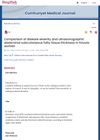 3 citations,
January 2023 in “American journal of physiology. Cell physiology”
3 citations,
January 2023 in “American journal of physiology. Cell physiology” Inward rectifier potassium channels are important in many body functions and diseases, and could be potential drug targets.
[object Object]  88 citations,
January 2019 in “Journal of Tissue Engineering and Regenerative Medicine”
88 citations,
January 2019 in “Journal of Tissue Engineering and Regenerative Medicine” Conditioned media from mesenchymal stem cell cultures could be a more effective alternative for regenerative therapies, but more research is needed.
 May 2024 in “International journal of nanomedicine”
May 2024 in “International journal of nanomedicine” Plant-derived extracellular vesicles show promise for treating diseases like cancer and inflammation.
 1 citations,
November 2018 in “Therapeutic Delivery”
1 citations,
November 2018 in “Therapeutic Delivery” New partnerships, clinical trials, and drug approvals marked progress in therapeutic delivery in July 2018.
 8 citations,
May 2017 in “Current traditional medicine”
8 citations,
May 2017 in “Current traditional medicine” Stinging nettle has compounds that help with joint pain, arthritis, and prostate issues.
 January 2008 in “Springer eBooks”
January 2008 in “Springer eBooks” Thyroid disease can cause hair loss and treating thyroid problems might help with hair disorders.
 144 citations,
March 2013 in “Circulation Research”
144 citations,
March 2013 in “Circulation Research” K_ATP channel gene mutations are linked to heart diseases, but more research is needed to understand the connection and treatment potential.
 July 2024 in “ADMET & DMPK”
July 2024 in “ADMET & DMPK” Surface-modified nanostructured lipid carriers can improve hair growth treatments.
1 citations,
February 2024 in “Cosmetics” Cannabidiol shows promise as an effective treatment for acne.
 May 2024 in “International Journal of Nanomedicine”
May 2024 in “International Journal of Nanomedicine” Biodegradable polymers can improve cannabinoid delivery but need more clinical trials.
 10 citations,
July 2018 in “Our Dermatology Online”
10 citations,
July 2018 in “Our Dermatology Online” Some vitamins and minerals are important for preventing hair loss, but treating hair loss with them without a known deficiency is not proven effective.

Thermal spring waters and their microbes could be good for skin health and treating some skin conditions in skincare products.
 5 citations,
February 2022 in “International Journal of Molecular Sciences”
5 citations,
February 2022 in “International Journal of Molecular Sciences” Different immune cells like platelets, mast cells, neutrophils, macrophages, T cells, B cells, and innate lymphoid cells all play roles in skin wound healing, but more research is needed due to inconsistent results and the complex nature of the immune response.
 September 2018 in “Cumhuriyet medical journal”
September 2018 in “Cumhuriyet medical journal” Women with more body hair tend to have thicker belly fat and more metabolic health issues.
 1 citations,
June 2017 in “International journal of reproduction, contraception, obstetrics and gynecology”
1 citations,
June 2017 in “International journal of reproduction, contraception, obstetrics and gynecology” N-acetylcysteine was more effective and had fewer side effects than metformin for improving insulin resistance in women with PCOS.
 2 citations,
August 2021 in “Journal of Turkish sleep medicine”
2 citations,
August 2021 in “Journal of Turkish sleep medicine” People with polycystic ovary syndrome are more likely to have poor sleep, restless legs syndrome, anxiety, and depression.
 3 citations,
September 2021 in “International Journal of Molecular Sciences”
3 citations,
September 2021 in “International Journal of Molecular Sciences” Androgens and a high-fat diet may increase the risk of severe COVID-19 in women with PCOS by upregulating certain proteins in the heart and kidneys.
[object Object]  December 2022 in “The Indian journal of chest diseases & allied sciences”
December 2022 in “The Indian journal of chest diseases & allied sciences” Women with PCOS often have sleep problems, including sleep apnea, which are linked to obesity and depression.
 4 citations,
May 2024 in “The Lancet”
4 citations,
May 2024 in “The Lancet” Bariatric surgery improves ovulation rates in women with PCOS and obesity better than medical therapy.
 January 2022 in “Surgical and Cosmetic Dermatology”
January 2022 in “Surgical and Cosmetic Dermatology” People with androgenic alopecia (AGA) have a higher chance of getting metabolic syndrome.
 9 citations,
July 2009 in “Journal Of Endocrinology, Metabolism And Diabetes Of South Africa”
9 citations,
July 2009 in “Journal Of Endocrinology, Metabolism And Diabetes Of South Africa” The document concludes that managing PCOS involves treating symptoms and reducing long-term metabolic risks, with lifestyle changes being important.
 45 citations,
January 2006 in “Endocrine journal”
45 citations,
January 2006 in “Endocrine journal” To diagnose Polycystic Ovarian Syndrome, two out of three signs—irregular periods, high male hormone levels, or cysts on the ovaries—are needed.
 2 citations,
October 2022 in “Frontiers in genetics”
2 citations,
October 2022 in “Frontiers in genetics” Late diagnosis of congenital adrenal hyperplasia can greatly affect physical development, gender identity, and sexual health.
 5 citations,
September 2021 in “Cureus”
5 citations,
September 2021 in “Cureus” Depression in women with Polycystic Ovarian Syndrome (PCOS) is linked to insulin resistance and hyperandrogenism, and managing these can help reduce depression. Lifestyle changes and Cognitive Behavioral Therapy can be effective treatments.
6 citations,
September 2023 in “International journal of molecular sciences” Oxidative stress worsens PCOS by damaging cells and disrupting metabolism, suggesting antioxidant treatments might help.
 November 2022 in “The Journal of Clinical Endocrinology and Metabolism”
November 2022 in “The Journal of Clinical Endocrinology and Metabolism” Postmenopausal hyperandrogenism, a condition with symptoms like increased hair growth and acne, is usually caused by PCOS but can also be due to other factors. It's diagnosed by checking testosterone levels and treated either by removing the adrenal tumor or through antiandrogen therapy.
 30 citations,
April 2014 in “Seminars in Reproductive Medicine”
30 citations,
April 2014 in “Seminars in Reproductive Medicine” Diagnosing PCOS in teenagers is hard because its symptoms often look like normal puberty, and there's a need for better diagnosis methods and agreement on criteria.
 26 citations,
August 2014 in “Genetic Testing and Molecular Biomarkers”
26 citations,
August 2014 in “Genetic Testing and Molecular Biomarkers” High levels of TNF-α may contribute to obesity and insulin resistance in PCOS, but not due to the C850T genetic variation.
 16 citations,
April 2018 in “Current opinion in gynecology and obstetrics”
16 citations,
April 2018 in “Current opinion in gynecology and obstetrics” Hispanic women with PCOS are more likely to have liver diseases like NAFLD and NASH.
 2 citations,
February 2021 in “Endocrinology, diabetes & metabolism case reports”
2 citations,
February 2021 in “Endocrinology, diabetes & metabolism case reports” A teenage girl had both a rare ovarian tumor and a severe form of polycystic ovarian syndrome.




























